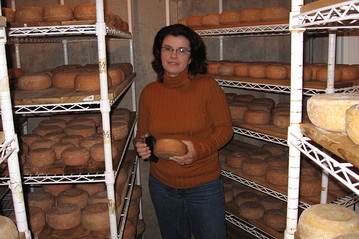 At this year’s annual American Cheese Society competition, aficionados and producers were dazzled by a newcomer: Hidden Springs Creamery of Westby, Wis., won six awards, including two first-place honors.
At this year’s annual American Cheese Society competition, aficionados and producers were dazzled by a newcomer: Hidden Springs Creamery of Westby, Wis., won six awards, including two first-place honors.
Tasters may have been puzzled by how this cheesemaker emerged from nowhere. Just two years ago, Hidden Springs did not exist and its owner, Brenda Jensen, was working as a manager at a global packaging company.
Today, Ms. Jensen can be found milking sheep and hand-crafting two-pound wheels of cheese. After 25 years in the corporate world, Ms. Jensen, 47 years old, decided to quit her job and start a creamery. Her first-place Ocooch Mountain cheese, a European Bufont-style aged cheese, is gaining prestige in the artisanal cheese world. Her creamy sheep’s milk cheese, Driftless, which comes in flavors ranging from basil to lavender, has garnered a number of local and national awards, including three at the 2007 American Cheese Society competition, which is considered the U.S.’s premiere cheese festival.
“Brenda sends me this almost flawless cheese that is consistent and sharp,” says Lenny Rice, the buyer for Cowgirl Creamery, which carries Ocooch Mountain and Driftless cheese at its stores in California and Washington, D.C. “One of the reasons is she has put a lot of care into the milk.”
Ms. Jensen is among a growing number of dairy farmers who have left corporate jobs for the allure of the cheese world. According to the American Cheese Society, which represents artisanal and craft cheesemakers, the number of cheesemakers who have joined the organization has more than tripled in the past seven years, from 426 in 2001 to 1,346 in 2007. And cheesemaking has attracted producers from non-food backgrounds. Jeff Roberts, author of “The Atlas of American Cheese,” found that almost a third of artisanal cheesemakers in 2006 had come from other careers ranging from doctors to dotcommers.
“It’s a desire to do something outside of the corporate world, to do something with nature, to do something on your own,” says Mike Gingrich of Uplands Cheese Company, in Dodgeville, Wis. Mr. Gingrich spent several years as an executive at Xerox Corp. and on a venture capital team before settling into the dairy business nine years ago. His Pleasant Ridge Reserve cheese won two American Cheese Society “Best in Show” awards. “I have never been in a business like this where your customers are helpful, where your competitors are helpful. It’s not as cutthroat.”
Adds Laura Werlin, author of “Laura Werlin’s Cheese Essentials”: “The lifestyle appeals to people. I think we revere cheese makers in a way that we don’t other agricultural producers. It’s harder to stand out if you are a really good blueberry maker than if you are a really good cheesemaker.”
A demand for artisanal cheese has helped foster these new cheesemakers. The rising cost of transporting cheese from Europe, in addition to the weakened dollar, has driven up the price of imported cheese by as much as 30%, forcing many consumers to look to cheaper domestic products. In addition, Jeanne Carpenter, a spokeswoman at the Wisconsin Diary Business Innovation Center, points to a shift in American taste towards bolder and farmstead cheeses.
“We have gone from the 1970s when everybody wants to eat this commodity Kraft cheese to one where they want a cheese that is funky and has a story behind [it]. The artisanal cheesemaker provides this,” Ms. Carpenter said, noting that the number of farmstead cheesemakers in Wisconsin has increased from 10 to 44 in the past decade. “It’s really been consumer driven.”
To be sure, becoming a cheesemaker is no simple task. Average start-up costs are about $250,000, says Ms. Carpenter, and cheesemakers must take a series of classes to become certified. And once you’re knee-deep in cow manure, the lifestyle may not seem quite as romantic.
“You got to really love it,” says Ms. Rice of Cowgirl Creamery. “They might be wealthy coming into it, but they are not going to get wealthy making cheese. We have a seen a couple of instances of people who worked in the dotcom industry, sold out their stock and opened a dairy farm — and they were quickly humbled by the lifestyle. Those animals become your children. You’re up at 3 o’clock in the morning to tend to them.”
Ms. Jensen was the manufacturing manager at Milprint, a division of packaging giant Bemis Co. in Lancaster, Wis, before she decided to leave her $80,000-a-year job for the cheese world in 2006.
“I always knew that I would live in the country and have a barn,” says Ms. Jensen, who grew up on a “hobby farm” in Benoit, Wis., where she and her brothers helped tend to chickens, rabbits, horses and a milk cow. “But I didn’t know much beyond that. I never thought I would have sheep.”
For fun, she and her husband, Dean, a mental health physician, decided to buy about 50 milking sheep for their 76-acre farm four years ago. In November 2005 she attended a three-day cheese-making and started experimenting with cheese.
Today, Ms. Jensen’s retails Hidden Valley Creamery cheese for $20 to $40 a pound at specialty stores across the country. She made about 6,000 pounds of cheese in 2007 and expects to make a total of 12,000 pounds by year end. Ms. Jensen says she is $20,000 away from being profitable.
“It was the whole romance of it,” she says. “The smell of the milk, the feel of the cheese — I didn’t realize how intimate you could become with the cheese making process.”
Filed under: Uncategorized | Tagged: cheese business, cheese story, Hidden Springs Creamery | Leave a comment »


